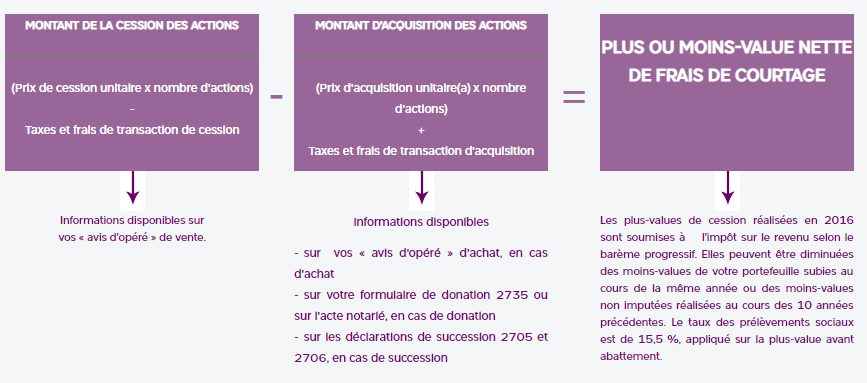Factsheets
Ordres en Bourse
Plus-values et fiscalité
Transmission d'action et fiscalité
STOCK ORDERS
Understanding how the Stock Exchange works
The stock market is a regulated market that brings together companies with funding requirements and investors, including individual investors.
Shares are bought or sold through a stock order.
In practice
How to choose your stock exchange order ?
To trade on the stock exchange, you can place an order with your regular financial intermediary.
The 3 most frequently used stock orders are as follows:
1. “LIMIT PRICE” ORDER
- Maximum purchase price or minimum sell order (limit) to be set by you.
- The order is executed only when the price is lower or equal to this limit for the purchase, or higher or equal to this limit for the sale.
- If the quantity of negotiable shares on the market is not available at the set limit price, the execution of the order may be partial.
2. “BEST PRICE” ORDER
- You have not indicated an exact price.
- The order will be executed at the best price available when it reaches the market, for both buy and sell orders.
- If the quantity of negotiable shares is not available at this best price, the execution of the order may be partial.
3. “MARKET PRICE” ORDER
- There is no price limit on this order.
- But, this order is given priority over all other types of orders and its execution is fully completed.
Share ID sheet
SOLOCAL GROUP SHARE AS OF 15 SEPTEMBER 2017:
CONTINUOUS TRADING ON EURONEXT PARIS (COMPARTMENT C)
- Value Code : ISIN FR0012938884
- Number of shares : 581,530,579 shares
- Closing price : 0.993 €
- Market capitalization : €577 million
Plus d'information sur la page 'Cours de l'action'
CAPITAL GAINS AND THEIR TAXATION
The gain on the sale of shares is called a “capital gain”. It is the difference between their sale amount and their purchase amount.
Tax deductions
Capital gains are subject to a tax deduction based on how long the shares have been held since their acquisition date:
- 50% for a share holding period from 2 to 8 years;
- 65% for a share holding period of 8 years or more.
Focus
The alternatives that provide exemption from capital gains tax are as follows:
- Having a share savings plan, and keeping your shares for a period of five years from the account opening date. The capital gains realized after this period are only subject to social security contributions. Important: shares from another account cannot be transferred to a share savings plan. Only transfers from the share savings plan’s cash account can be used to invest in shares. The cash investment limit is €150,000 per plan.
- Making a gift is still fully exempt from rights, taxes and social contributions up to maximum amounts set by French law. Unrealized capital gains on shares are then tax exempt, as long as the transaction is reported to the tax authorities (see pages 46-47 on passing on shares and taxation). Plan to make your end-of-year gifts from September.
Deduction of losses
The losses are attributable without a tax deduction on the capital gains. To determine the taxable amount, the balance obtained in this way benefits from the tax deduction linked to the holding period for sold shares that resulted in a capital gain. The taxpayer is responsible for calculating and declaring in the 2042 form the net amount of the tax deduction f or the holding period applicable to the capital gains (page 3, box 3SG) and the net amount after the tax deduction (page 3, box 3VG if taxable capital gain or box 3VH if loss). The 20 74 form can be used to itemize your calculations.
Remember
- Wealth tax: choose the right calculation method
- The value of your share portfolio is included in your taxable assets for the “Impôt de Solidarité sur la Fortune (ISF)”, or “wealth tax”. The tax authorities allow two ways of valuing your assets: either the closing price for the SoLocal share; or the average closing price for the last 30 trading days for the SoLocal share. The tax administration allows taxpayers to choose the most advantageous valuation for each share in their portfolio. This information appears on you recent account statement or can be consulted in your personal online account
New: tax on financial transactions
From January 1, 2017, the tax rate on share acquisitions changed from 0.2% to 0.3%. Please note that this tax applies only to share purchases. The 2017 Finance Tax states that this increase applies to transactions negotiated on December 29 and 30, 2016 and completed from 2017.
PASSING ON SHARES AND TAXATION
Passing on your shares in advance allows you to benefit from an advantageous tax framework, encourages your loved ones to save and educates them about the stock market. You thereby also share your commitment to the SoLocal Group.
The elements of taxation in this factsheet apply to French residents for tax purposes.
HAND-TO-HAND GIFTS
Principle
Facilitated transmission of your shares to your loved ones
Overview
Tax advantages
Written agreement from both parties. In order to value the shares passed on, the grantee’s local tax authority must be notified of the gift within one month, using French tax form 2735
Hand-to-hand gifts have to be added to the grantor’s estate and included in the allocation of the grantor’s assets
Acquisition price valued at the average share price on the day of the tax declaration or, if this is higher, at the average price on the day of the gift
SHARED-GIFTS
Principle
Anticipated total or partial allocation of your shares to your children
Overview
Donation only to children
Tax advantages
Lower inheritance taxes
Notarial deed and declaration of the gift carried out by the notary
Not added to the grantor’s estate
Acquisition price valued at the average share price on the day of the gift or at the closing price of the previous trading day
SIMPLE GIFTS
Principle
Anticipated allocation of your shares to the beneficiary of your choice
Overview
Tax advantages
Notarial deed and declaration of the gift carried out by a notary
May be added to the grantor’s estate
Acquisition price valued at the average share price on the day of the gift or at the closing price of the previous trading day
CUSTOMARY GIFTS
Principle
A present given on a special occasion (wedding, birthday, Christmas, etc.)
Overview
Must represent a relatively small share of the grantor’s assets
Does not need to be declared to the fiscal authorities
Not added to the grantor’s estate
Acquisition price of zero: when these shares are s old, the c apital gain r ealized will be equal to the total net sale amount
Remember
- Inheritance: the choice is yours!
You can decide how your assets, including your share portfolio, will be distributed among your heirs.
Upon your death, a declaration signed by your notary stating your marital status, the names of all beneficiaries and the number of shares attributed to each beneficiary is sufficient to distribute a portfolio.
Your financial establishment for intermediary registered shareholders and bearer shareholders, will execute all instructions given by your notary or the person managing your estate
Examples of situations
1. Inter-vivos distribution donations allow you to pass on your shares while continuing to receive the dividends, i.e. retain the usufruct. The usufruct can be full or partial. Donation rights are reduced as they are based on the bare ownership value of the donation. French solidarity tax on wealth (IFS) is imposed on the beneficial owner. On the death of the grantor, the bare owners recover the usufruct and therefore full ownership of the shares. Dividends from free shares attributed after the donation are also paid to the beneficial owner.
2. The ban on giving up your shares prevents the sale of the shares or their donation for a set period.
3. The right of return allows the grantor to take possession of the shares again if the grantee dies first.
Focus
Tax exemption for donations
Every 15 years you are able to make a tax exempt donation for up to:
- 100,000 € for each child and from each parent
- 80,724 € for a spouse or civil partner
- 31,865 € for each grandchild
- 15,932 € for each brother and sister
- 7,967 € for each nephew or niece
- 5,310 € for each great grandchild
Vérifiez votre visibilité
sur internet Cliquez ici pour vérifier votre visibilité sur internet


